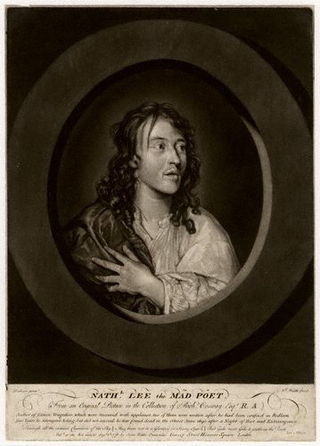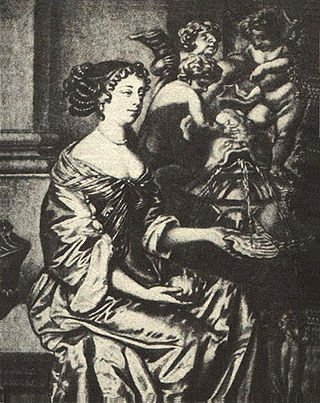Related Research Articles

John Dryden was an English poet, literary critic, translator, and playwright who in 1668 was appointed England's first Poet Laureate.

Nathaniel Lee was an English dramatist. He was the son of Dr Richard Lee, a Presbyterian clergyman who was rector of Hatfield and held many preferments under the Commonwealth; Dr Lee was chaplain to George Monck, afterwards Duke of Albemarle, but after the Restoration he conformed to the Church of England, and withdrew his approval for Charles I's execution.
Elizabeth Boutell, was a British actress.

Mary Saunderson (1637–1712), later known as Mary Saunderson Betterton after her marriage to Thomas Betterton, was an actress and singer in England during the 1660s and 1690s. She is considered one of the first English actresses.
Rebecca Marshall was a noted English actress of the Restoration era, one of the first generation of women performers on the public stage in Britain. She was the younger sister of Anne Marshall, another prominent actress of the period.
Mary, Lady Slingsby, born Aldridge, was an English actress. After a marriage lasting 1670 to 1680 to John Lee, an actor, during which she was on the stage as Mrs. Lee, she was widowed. She then married Sir Charles Slingsby, 2nd Baronet, a nephew of Sir Robert Slingsby, and performed as Lady Slingsby. Theatre historians have pointed out the difficulty in identifying her roles in the period when Elinor Leigh, wife of Anthony Leigh, was performing as Mrs. Leigh, because the homophones "Lee" and "Leigh" were not consistently spelled at the time.
Joseph Williams was an English stage actor of the seventeenth and early eighteenth century.
Thomas Gillow was an English stage actor of the Restoration era. His name was sometimes written Gilloe or Gillo.
John Wiltshire was an English stage actor of the Restoration Era. He joined the King's Company in 1675, before transferring to the rival Duke's Company in 1679 possibly as a replacement for Matthew Medbourne who was arrested in the Popish Plot and subsequently died in Newgate. From 1682 until his death he was part of the merged United Company. According to the autobiography of Colley Cibber he subsequently joined the English Army as captain and was killed in action fighting with William III's forces in Flanders during the Nine Years' War. His surname is also sometimes spelled as Wilshire.
Philip Griffin was an English stage actor of the seventeenth century and early eighteenth century. He joined the King's Company at Drury Lane during the 1670s, and was later a member of the merged United Company from 1685. He was named as a manager at Drury Lane in 1695, but then took military service and was styled as Captain Griffin. In 1699 he went to act in Dublin as part of Joseph Ashbury's company at the Smock Alley Theatre, but was back in London where he acted until retired from the stage in 1707.

Henry Harris was an English stage actor and theatre manager. Initially a painter he was a founder member of the new Duke's Company in 1660 following the Restoration which established itself at the old Salisbury Court Theatre before moving to the new Lincoln's Inn Fields Theatre shortly afterwards. Due to his background Harris may have been a set designer and painter during his early years with the company. However, by 1661 he was acting, and his first recorded role was in William Davenant's The Siege of Rhodes that summer. He quickly established himself as the second actor in the troupe after Thomas Betterton.
John Crosby was an English stage actor of the Restoration Period. He first recorded performance is in 1662 when he appeared in Ignoramus at Whitehall Palace, likely as a child actor. It was further eight years before he was solidly established in the Duke's Company in 1670 beginning with The Forc'd Marriage by Aphra Behn. He became a regular with the company over the following decade, often playing young lover roles. He retired from the stage in 1679 and later became a justice of the peace for Middlesex. He died on 8 April 1724 and was buried in St Sepulchre.
Martin Powell was an English stage actor of the seventeenth century. Powell was a member of the King's Company from 1669 onwards at the Theatre Royal, Drury Lane in London. He was one of several actors who briefly left for Scotland in 1678 after a dispute with the management, before returning to Drury Lane. In 1682 he joined the merged United Company. Billed throughout his career as Mr. Powell, some of his later appearances can be confused with those of his son George Powell.
Elizabeth James was an English stage actress of the seventeenth century. She was a member of the King's Company, based at the Theatre Royal, Drury Lane. Several of her known performances were in the premieres of work by John Dryden. She also featured in the debut of William Wycherley's The Country Wife in 1675. Her last known stage role was in 1676, although it appears she was still in the public eye more than a decade later.
Thomas Clark was an English stage actor of the seventeenth century. He was a long-standing member of the King's Company, based at the Theatre Royal, Drury Lane in London, from 1670 onwards. He was part of the group of actors who briefly left for Edinburgh in 1679 after a dispute with the management of the company.
Elizabeth "Betty" Cox was an English stage actress of the seventeenth century.
Marmaduke Watson was an English stage actor of the seventeenth century. Part of the King's Company based at the Theatre Royal, Drury Lane, he was one of the actors who sided with Charles Killigrew during a dispute in the company in 1677. In 1682 when the United Company was formed he left and went to Dublin to join the Smock Alley Theatre. He later returned to London where his final known performances were with Thomas Betterton's company at the Lincoln's Inn Fields Theatre.
Richard Bell was an English stage actor. He joined the King's Company based at the Theatre Royal, Drury Lane in 1668. Considered a promising actor he appeared in the premieres of two plays by John Dryden and William Wycherley's debut Love in a Wood. His career was cut short when he was killed in a fire that destroyed the Drury Lane theatre in January 1672. A planned role for him in Wycherley's new play The Gentleman Dancing Master had to be cut.
John Coysh was an English stage actor of the seventeenth century. He was a member of the King's Company, based at the Theatre Royal, Drury Lane.
References
- ↑ Wilson p.34